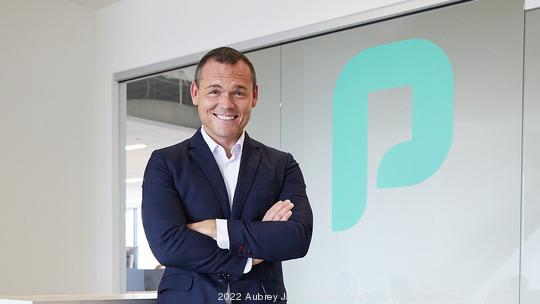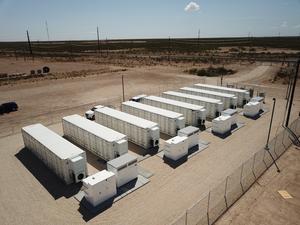
Anthony Carroll didn’t last long as chief revenue officer at Powin.
Just seven months into the job, he’s been promoted to president at the company, which has its headquarters in Tualatin and an office in Portland.
The move comes as the battery energy storage integrator continues a growth rampage that has taken it from $32 million in revenue in 2019 to a likely $600 million to $700 million this year, according to Carroll.
“Now is the time to restructure our teams and leverage Anthony’s leadership for the benefit of our customers so we can continue to execute on our vision of an energy future that is clean, resilient, and accessible,” Powin CEO Geoff Brown said via email. “Anthony has been a huge asset to our team and the company is thrilled to have him take on this critical role as we enter our next phase of growth.”
Powin sources battery cells from a variety of vendors for its own designed and manufactured energy storage systems managed by proprietary software. The systems are increasingly sought as utilities and other grid players turn to big battery installations that help make room for more intermittent renewable energy.
Though only 39, Carroll is a veteran of major energy players, with stints at Schneider Electric and, most recently, Siemens Gamesa, where he ran North American operations for the company’s Gamesa Electric subsidiary.
Another company on his resumé, Power Electronics in Spain, also falls into the category of major player, although it was a small, family-owned company when he started a nine-year run there after earning his MBA in Spain.
Powin, tiny and unknown in energy storage when it got into the sector in 2016, has plied a similar path. That resonated with Carroll when he was being wooed by the company. And he sees Powin’s upstart qualities — fearless and friendly at the same time — as a continuing asset, even as it now trails only Tesla in the U.S. grid-storage market.
“If we count the orders we’ve received from customers on projects to execute, we’re north of $1.5 billion right now,” Carroll said. “I would say that our key is to keep the startup mindset and be a multibillion-dollar corporation. That’s the secret. I think if we can do that, we can be the largest energy storage integrator on the planet and still make people feel that they're working with a company that really cares.”
More than $235 million in private equity investment in the past two years, including participation by GIC, Singapore’s sovereign wealth fund, is helping Powin makes big moves in a sector that Carroll says remains young and turbulent.
One of those moves was the recent acquisition of EKS, a Spanish company that makes power conversion systems needed to connect battery arrays to the grid. Having a reliable supplier and developer in-house was key because those systems can be “the Achilles heel” of batteries, Carroll said.
“Powin, because of the investments we got from GIC and others, was able to purchase that company in Spain with 100 employees, most of them engineers, and continue to grow not only our value proposition but also de-risk the business because now we build our own equipment,” he said.
Optimism is high that growth can continue, though it will require continued innovation, Carroll said. In the U.S., where the company now does about 80% of its business, new federal policies will give systems that are domestically sourced a competitive advantage. Carroll said to look forward to announcements of moves on that front from Powin.
At the same time, the company, which has more than 300 U.S. employees, expects growth outside the U.S. to be even stronger. Carroll said he recently presented a plan to the Powin board, which was accepted, on that topic.
“The goal is in two or three years to be 50-50, to basically continue to be a massive corporation in the U.S., but for half of our revenue to come from outside of the U.S.," he said.







